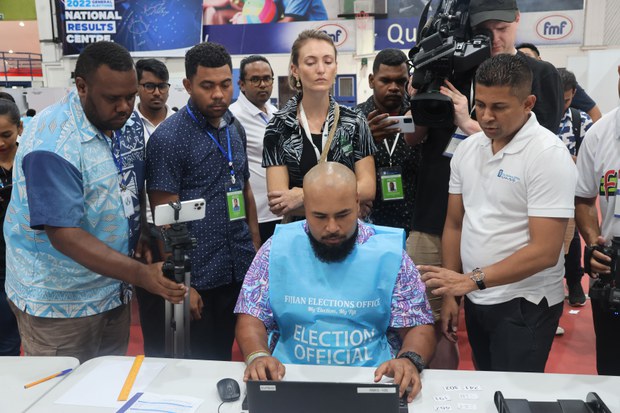Fiji’s ruling party, opposition in tight race as vote count nears completion
2022.12.17
Wellington
 Reporters and officials watch as Mohammed Saneem (right), Fiji’s Supervisor of Elections, explains the election results management system at the National Results Centre in Suva, Dec. 15, 2022.
Reporters and officials watch as Mohammed Saneem (right), Fiji’s Supervisor of Elections, explains the election results management system at the National Results Centre in Suva, Dec. 15, 2022.
Neither Fiji Prime Minister Frank Bainimarama’s party nor the main opposition have won an outright majority of votes in the Pacific island country’s national election, nearly complete official results showed on Sunday.
The Fiji First Party, led by Bainimarama, suffered a slump in voter support, securing about 42.6% of votes in the election held on Wednesday, down from 50% in 2018.
Opposition leader Sitiveni Rabuka’s People’s Alliance Party and a smaller party allied with it had secured a combined 44.7% of votes.
The results could put the Social Democratic Liberal Party, known as Sodelpa, in a kingmaker role with just over 5% of the vote. Bainimarama had ousted Sodelpa in a 2006 coup.
As of Sunday morning (local time), about 98% of polling stations had been counted, according to the Fijian Elections Office. It said the official vote count will be completed later on Sunday.
Some opposition parties had called the results into question because of a temporary glitch with the Fijian Elections Office’s results reporting app, but international observers said there were no significant irregularities with voting.
“Voting took place in a calm, peaceful environment,” the Multinational Observer Group said in a statement on Friday. International observers “did not observe any significant irregularities or issues during pre-polling, postal voting, or election-day voting,” it added.
Rabuka was questioned by police on Friday after calling for a recount because of the app glitch, but he was not charged.
Voters were concerned about the rising cost of living and slow economic development in the country of nearly one million people. Faultlines between majority indigenous Fijians and minority Indian Fijians and Christian, Hindu and Muslim faiths remained in the background.
Fiji has had four coups since independence in 1970, partly a legacy of British colonial policies that restricted the economic activities of indigenous Fijians while bringing tens of thousands of indentured laborers from India in the late 19th century and early 20th century.
The first two coups led by Rabuka, then a lieutenant colonel, highlighted the divisions that had developed in Fiji over decades. The coups followed the election defeat of a predominantly indigenous Fijian political party.
Bainimarama, who abolished a race-based voting system following his 2006 coup, did not hold elections until 2014. His Fiji First Party has commanded support from indigenous and Indian Fijians but recently has been challenged by the economic fallout of Covid-19 in tourism-reliant Fiji.
With a population of nearly 1 million, Fiji is the second most populous Pacific island nation after Papua New Guinea. Indigenous Fijians are the majority and the proportion of Indian Fijians has dropped to about 38% from 50% in the 1980s because of emigration spurred by the coups.







